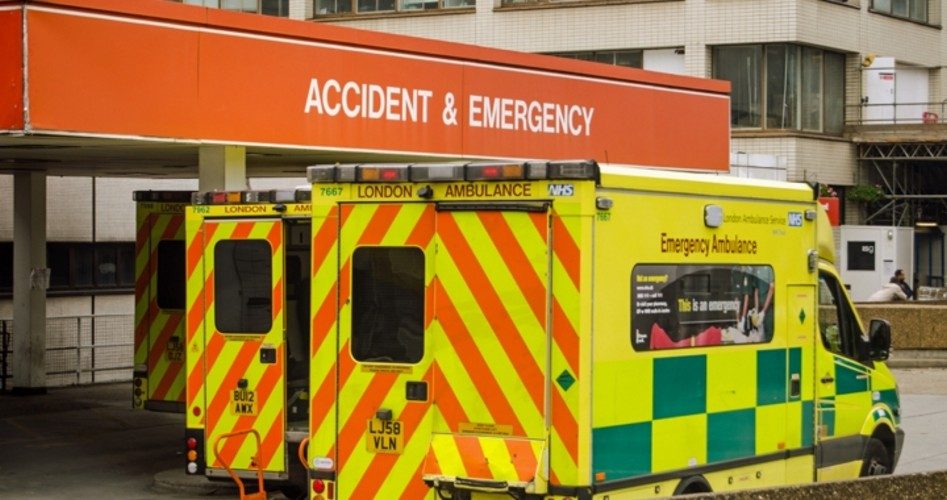
Britain’s National Health Service (NHS), reeling from a bad flu season and the chronic shortages common to socialized medicine, is postponing 55,000 noncritical operations and urging people not to go to hospitals except in emergency situations.
After a meeting of the National Emergency Pressures Panel, NHS medical director Bruce Keogh announced the policy changes. They include deferring all elective surgeries until February, allowing hospitals to open mixed-sex wards, and turning prospective emergency-room patients away if they are not seriously ill. According to the Daily Mail, “It is the first time NHS England has told hospitals to take such drastic measures during the winter.”
Although the winter crunch is a common problem for the NHS, this year’s crisis appears to be among the worst. “Dr. Peter-Marc Fortune, from the Royal College of Pediatrics and Child Health, said pressures have reached ‘extreme’ levels,” and even NHS England’s director for acute care, Professor Keith Willett, “suggested the situation was at its worst since the 1990s,” reported the paper.
According to the BBC, Willett tried to put a good face on the situation, saying, “With the incidents of flu rising in the community and in our hospitals, and the pressures that we always see in the first few weeks of January … it’s important we give the hospitals time and space to manage the demand that we anticipate will come through.”
The problems plaguing the NHS are truly severe.
Milton Keynes University Hospital told the BBC it had seen “very high numbers of patients seeking emergency medical care” and had even opened an “unprecedented number of [extra] beds.” Professor Joe Harrison, the hospital’s chief executive, said, “I would urge people to avoid the hospital’s emergency department unless it is a genuine emergency.”
Many hospitals have taken to housing and treating patients on gurneys in corridors, a situation one doctor referred to on Twitter as “battlefield medicine.”
An 80-year-old man suffering from epilepsy and dementia was kept waiting on a gurney in the hall of the Royal Stoke Hospital for 36 hours, said the Mail. One of the hospital’s emergency-room physicians, Dr. Richard Fawcett, leaked the news “that the department had run out of corridors to house patients.” On Twitter, Fawcett apologized for the “third-world conditions” patients had to endure.
Mark Nevinson, a nurse at James Cook Hospital, tweeted that he was “ashamed of the substandard care we are now offering.”
Ambulance services are also overwhelmed, with the result that “firefighters with six days of first aid training are being sent to thousands of medical emergencies,” reported the Mail. And even when an ambulance gets a patient to a hospital, paramedics can wait hours to get the patient into the building.
Prime Minister Theresa May denied a crisis exists. Just as naturally, her political opponents blamed her for the disaster, saying her government had refused to give the NHS the funding it needed. Yet, as the Mail pointed out, “budgets have risen significantly in real terms since 2010” — just not as much as needed to keep up with the public’s demands for “free” healthcare.
That, as always, is the problem with socialized medicine. As long as patients aren’t paying for their own care, they will tend to demand more of it than necessary. The supply, however, is always limited, and so shortages result, with rationing of care the inevitable denouement. Hospitals can plead with patients to go elsewhere (or simply suffer through the sniffles), and ambulances can ask them to find alternative transportation (as some have done), but patients have no incentive to comply with these requests since they don’t have to foot the bill.
Rather than face facts and end its failing experiment in socialism, the British government continues to believe that it can defy the laws of economics with, in Willett’s words, “a national, regional, and local structure” to deal with the shortages — a method no different in practice from the Soviet Union’s endless and fruitless five-year plans to make socialism work.
It may be a bitter pill to swallow, especially for a people accustomed to “free” healthcare, but the only genuine solution to the NHS’s woes is to jettison the NHS and let the free market provide healthcare.
Photo: AmandaLewis/iStock Editorial/Getty Images Plus


